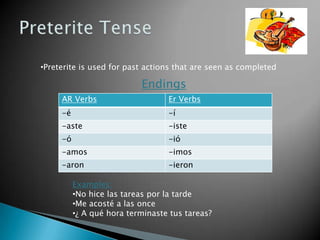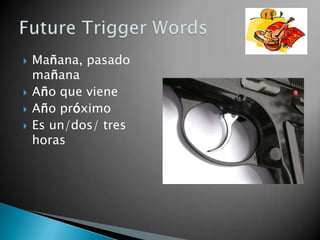Español 3 Grammer Book- Mateo Y.
- 3. Table of Contents (Cont.)
- 4. Preterite TensePreterite is used for past actions that are seen as completedEndingsExamples:No hice las tareas por la tarde
- 5. Me acosté a las once
- 6. ¿ A qué hora terminaste tus tareas?Preterite Trigger WordsThese are the words which will tell you when to use the preterite rather than other tenses such as the present or imperfect tense.
- 7. Examplesyo jugué (jugar)yo busqué (buscar)yo almorcé (almorzar)Car/Gar/Zar VerbsCommon Verbs
- 9. Andar: Anduv-Estar: Estuv-Poner: Pus-Poder: Pud-Querer: Quis-Saber: Sup-Tener: Tuv-Venir: Vin-Decir: Dij-Traer: Traj-Conducir: Conduj-Cucaracha VerbsOther IrregularsVerbs Ending in –uir change in 3rd person change to yó and yeron
- 10. All –ir stem changing verbs in the present tense change from e-i or o-u in the 3rd personir stem-changing verbs do change in the preterite (e:i and o:u third person singular and plural)Snake/Snakey VerbsER & IR verbs whose stems end in a vowel need a strong Y to replace the I in 3rd person forms.Examples:Examples:Leer- Leyó/ Leyeron
- 11. Imperfect TenseUse for actions that were in the past but not completedConjugationsExamplesYo trabajaba en la oficina.
- 13. Tú dormías These are the words which will tell you when to use imperfect tense instead of a tense such as the present or preterite.Trigger Words
- 14. Irregulars in the Imperfect TenseThere are only three real irregulars in this tense and are conjugated below. ExamplesJuan iba a la iglesia los domingos.
- 15. Tú eras un alumno inteligente.
- 16. Nosotrosveíamos la tele. Preterite vs. ImperfectWhen to use:When to use:Expressing actions that are completeExpressing ending or beginning of an action in the pastTell a series of event in the past or a specific timeTell of an action still ongoingTell of events that were habitualTell of a state both physical or emotional as well as characteristicsSimultaneous event occurringVS.ExamplesExamplesYohablaba mucho cuando era niño.
- 17. Yo corría en la calle cuando eraniña.
- 18. Yo trabajé en la oficina ayer.
- 19. Yotomé la medicina.Ser vs. EstarConjugationsIn Spanish, both Ser and Estar translateto mean “tobe”. It can sometimesbetrickyto decide whichoneto use so weturnto DOCTOR PED and HELPING.
- 20. DOCTOR PEDSerDescription(Ella es baja.)Occupation(Soy doctor.)Characteristic(El es simpático.)Time / Date(Son las nueve.)Origin(Soy de Georgia.)Relationship(El es mi padre.)Possessions (Es mi mochilla.)Events (Mi cumpleanos es en mi casa.)Dates (Hoy es el nueve de junio )HELPINGEstarHealth (Ella esta enferma)Emotion (Ella esta feliz)Location (Esta en la escuela)PresentConditionINGVerbs ending in –ing -ando
- 22. Aburrir, Encantar, Faltar, fascinar, importar, interesar, molestar, quedar, caer bien/mal, doler, disgustar, hacer, faltar, preocupar, sorprender, apetecerWhen followed by verbs in the infinitive, always use singular formOften used in the conditional (me gustaría) to soften requestVerbs like GustarExamples:Me gusta tu pelo.
- 23. Nos faltan la escuela y tarea.Me, Te, Le, Nos, Les
- 24. EXLa casa es grande.El granero es mas grande que la casa.El castillo es el mas grande de todas.EXEste dinosaurio es feroz.Este dinosaurio es menos feroz que el otro.Este dinosaurio es el menos feroz del mundo.Comparativos y SuperlativosIrregularesBueno- mejorViejo- mayorMalo- PeorJoven- MenorNúmeros Hay mas de cinco elefantes. Hay menos de siete elefantes.La manzana es buenoEl plátano es mejor que la manzana.Las cerezas son las mejores de todos las frutas
- 25. Connecting WordsAunque- even thoughTambien- alsoMientras- whileA resir de- in spite ofPero- butPor lo tanto- ThereforeSin embargo/ no obstante- NeverthelessTransition WordsThese words can be used to link or connect different parts of a sentence.
- 26. Future TenseTo conjugate, simply take the infinitive of the verb and add the endings to the right on the end.This tense is used to tell what "will" happen, or what "shall" happen.It is also used to express wonder or probability in the present state.The future tense is not used to express a willingness to do something.ExamplesEl lunes iré al hospital. I'll go to the hospital on Monday.
- 27. Esta noche miramos la televisión. Tonight we'll watch TV.Serán las ocho. It must be 8:00.
- 28. Mañana, pasadomañanaAñoquevieneAñopróximoEs un/dos/ treshorasFuture Trigger Words
- 29. These verbs have the same endings as the normal future tenseThe future tense of the word hay is habrá: There will beFuture Tense IrregularsMeaningVerbsConjugationExamplesEnrique nosdirá la verdad.Enrique will tell us the truth.
- 30. ¿Quiénesvendránconmigo?Who will come with me?Pondré la mesa en seguida.I'll set the table right away.
- 31. Passing through- PortalGeneral rather than specific location- PortugalHow long something lasts- PoreverThe cause of something- PorpuseAn Exchange- Import/ExportDoing something in place of or instead of someone else- I’m por, pay for meA means of transportation- TransportationExamplesViajamosportressemanas.Me caí por la nievePor
- 32. For whom something is done- Surprise ParatyDestination- ParaguayThe purpose for which something is done- ParachuteTo express an opinion- Paradon me, but…To contrast of Compare- ComparaTo express idea of deadline- ParamedicPara
- 33. Conditional Form and IrregularsWould, Should, CouldOften used with verbs such as gustarEndingsíaíasíaíamosíanEx. ¿Quéhorasería?What time could it have been?Estaría en su casa.He must have been at home.
- 34. Madebycombining"has" or "have" with the past participleTwo verbs are required: the main verb and the auxiliary verb (Haber)Haber:hehashahemoshabéishanPresent Perfect TenseEx.He comido. I have eaten.He pagado la cuenta. I have paid the bill.
- 35. Formed by combining the auxiliary verb "had" with the past participle.Formed by using the imperfect tense of the auxiliary verb "haber" with the past participle. Haber:habíahabíashabíahabíamoshabíaishabíanPast Perfect TenseEx.Habíavivido. I had lived.Juanhabíaabierto las puertas. Juan hadopenedthedoors.
- 36. The future perfect is formed by combining the auxiliary verb "haber" with the past participle. In this case, "haber" is conjugated in the future tense.Used to describe what will have happened in the future before a different action takes place, or by a specific time.Haber:habréhabráshabráhabremoshabréishabránFuture Perfect TenseEx.Habrá pagado todas las deudas para el dos de octubre.He willhavepaidallthedebtbyOctober 2.Habremos vuelto de España para el doce de junio.WewillhavereturnedfromSpainby June 12.
- 37. Used when a verb or expression requiring the subjunctive in the main clause is in the present, future, or present perfectUsed to indicate the action as completed with governing verbs in the present or future tense or command formsHaberHayaHayasHayaHayamoshayanPerfect SubjunctiveEx. 1. I doubt that you did it Dudoque lo hayashecho
- 38. To form the comparisons of equality using adjectives or adverbs, use tan + adjective (adverb) + comoTo form comparisons of equality with nouns, use tanto(-a,-os,-as) + noun + comoTan vs. TantoEx.Juan tiene tanto dinero como María.(as muchmoney as)El libroestan buenocomo la película.(The book is as good as the movie.)
- 39. The English equivalent of 'one' and 'people.' Refers to an unidentified human agent. It only uses intransitive verbs and 'objectless' transitive verbs The verb is always singular. Ex. 1. En los EstadosUnidos se come mucho. People eat a lot in the United States.2. Se puede encontrar cocos en el mercado.You can findcoconuts in themarket.Impersonal “se”
- 40. Both used to express the idea "to know" Not interchangeablesaber: to know (facts, information, how to do something, something by heart)conocer: to know (to be familiar with people, places, things)Ex.1. Juan sabe donde está María.Juan knowswhereMariais.2. Alberto y Alfredo conocen Madrid.Alberto and Alfredo know (are acquainted with) Madrid.Saber vs. Conocer
- 41. Used when ordering, or telling someone to do something. This is often referred to as the "imperative" form of the verb.Informal, or familiar, speech is used among friends, coworkers, relatives, or when addressing a child. Formal speech is generally used to be polite or to express respect. For that reason, the formal commands are often referred to as polite commandsLos Mandatos- Informal vs. Formal
- 42. Tu Commands (Informal)Usted Commands (Formal)Affirmative Commands-ar verbs:-e (for Ud.), -en (for Uds.)-er and -ir verbs:-a (for Ud.), -an (for Uds.)The affirmative informal (tú) commands are formed the same way as the present indicative Ud. form
- 43. Tu Commands (Informal)Usted Commands (Formal)Negative Commandsnegative commands use the same verb forms as in the affirmative ones
- 44. Use the present subjunctive tú formEx.Di la verdad.(Tell the truth.)No digasmentiras.(Don't tell lies.)Haztutarea.(Do your homework.)No hagaseso.(Don't do that.)Irregular Commandsonly occur with affirmative tú commandsDOP and IOP PlacementThe I.O.P. is placed before a conjugated verb.In Spanish, the D.O.P. must be placed before the verb when there is only one verb. Ex.Tus padrestedandinero. Your parents give you money. (give money to you)Ex.Si, lovoy a comprar. (in front) Yes, I am going to buy it.
- 45. With affirmative commands, the final "s" of the verb form is dropped before adding the pronoun "nos“Let us = English EquivalentEx. Sentemos + nos = Sentémonos.Let's sit down.Nosotros Commands: Mono Verbs
- 46. The subjunctive mood is rarely used in English, but it is widely used in SpanishUsed to express everything except certainty and objectivity: things like doubt, uncertainty, subjectivity, etc.For most verbs, the present subjunctive is formed by following these three steps:Forming it:Start with the yo form of the present indicative. Then drop the -o ending. Finally, add the following endings: -ar verbs:-e, -es, -e, -emos, -éis, -en-er and -ir verbs:-a, -as, -a, -amos, -áis, -anSubjunctive Tense and TriggersEx. Nosalegramos de quetegustenlasflores.We are happy that you like the flowers.Temoquemisestudianteslluguentarde.Im afraid my students will arrive late.
- 47. dardédesdédemosdeisdenestarestéestésestéestemosestéisesténhaberhayahayashayahayamoshayáishayanSubjunctive Irregularsirvayavayasvayavayamosvayáisvayansabersepasepassepasepamossepáissepanser sea seas seaseamosseáisseanImpersonal Expressionsa menosque ...unless ...antes (de) que ...before ...con tal (de) que ...provided that ...cuando ...when ...convieneque ...it is advisable that ...después (de) que ...after ...dudarque ...to doubt that ...en caso de que ...in case ...en cuanto ...as soon as ...esaconsejableque ...it's advisable that ...esbuenoque ...it's good that ...esdifícilque ...it's unlikely that ...esdudosoque ...it is doubtful that ...esfácilque ...it's likely that ...esfantásticoque ...it's fantastic that ...esimportanteque ...it's important that ...esimposibleque ...it's impossible that ...These are just some of the more common interpersonal expressions. There are many more.impersonal expressions trigger the use of the indicative mood, since they introduce a quality of certainty or objectivity.
- 48. Indicate fear, happiness, anger, regret, surprise, or other sentiments or biasesExpressions of Emotion
- 49. take the indicative when the action in the subordinate clause is either habitual or in the past. The subjunctive is used when the main clause is a command or in the (potential) futurePhrases:asíqueas soon asCuandowhendespues de queafter en cuantoas soon as hastaqueuntil luegoqueas soon as tan pronto comoas soon as Conjunctions of TimeEx. Trabajéhastaquemisniños me llamaron. I worked until my kids called.Trabajohastaquemisniños me llaman. I (usually) work until my kids call.Trabajahastaquetusniñostellamen. Work until your kids call.Trabajaréhastaquemisniños me llamen. I'll work until my kids call.
- 50. Demonstrative Adjectives and PronounsSpanish has three words where English only has two. In English, we say "this" or "that" depending upon whether the object is close to us or not. In Spanish, we also say "this" and "that," but there is another, separate word used to mean "that one over there." This form is used when the object is more than just a short distance away, for example, on the other side of the room. Demonstrative adjectives agree in gender and number with the noun modified, and they regularly precede the noun.The demonstrative pronouns are the same in form as the demonstrative adjectives, but they always have the accent mark: éste, ése, aquél, ésa, aquélla, etc.estethis
- 51. esethat
- 52. aquelthat one over there










































